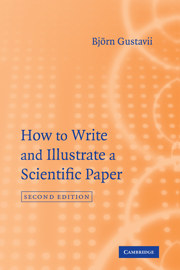Book contents
- Frontmatter
- Contents
- Preface
- Acknowledgments
- 1 Basic rules of writing
- 2 Comments on scientific language
- 3 Drafting the manuscript
- 4 Choosing a journal
- 5 Preparing a graph
- 6 Drawings
- 7 Figure legends
- 8 How to design tables
- 9 Title
- 10 Authors
- 11 Abstract
- 12 Introduction
- 13 Methods
- 14 Results
- 15 Discussion
- 16 Acknowledgments
- 17 References
- 18 Ph.D. and other doctoral theses
- 19 Letters and case reports
- 20 Numbers
- 21 Abbreviations
- 22 How to present statistical results
- 23 Typing
- 24 Dealing with editors and referees
- 25 Correcting proofs
- 26 Authors‘ responsibilities
- Literature needed on your desk
- Further reading
- Literature cited
- Index
2 - Comments on scientific language
Published online by Cambridge University Press: 05 June 2012
- Frontmatter
- Contents
- Preface
- Acknowledgments
- 1 Basic rules of writing
- 2 Comments on scientific language
- 3 Drafting the manuscript
- 4 Choosing a journal
- 5 Preparing a graph
- 6 Drawings
- 7 Figure legends
- 8 How to design tables
- 9 Title
- 10 Authors
- 11 Abstract
- 12 Introduction
- 13 Methods
- 14 Results
- 15 Discussion
- 16 Acknowledgments
- 17 References
- 18 Ph.D. and other doctoral theses
- 19 Letters and case reports
- 20 Numbers
- 21 Abbreviations
- 22 How to present statistical results
- 23 Typing
- 24 Dealing with editors and referees
- 25 Correcting proofs
- 26 Authors‘ responsibilities
- Literature needed on your desk
- Further reading
- Literature cited
- Index
Summary
A MEDLINE search showed that no fewer than 90 percent of papers listed in Index Medicus in 1999 were written in English, compared with 53 percent in 1966 (the year MEDLINE started). The saying “Publish in English or perish” must therefore be taken seriously. Regrettably, this means that many authors are obliged to write in a language other than their native tongue – with all that this can entail. Here I will share with you an episode from my own experience as a non-native writer of English.
English as a foreign language
My first paper published in English was initially written in Swedish and then translated into English by a professional translator. “Brilliant,” I thought when I saw the translated version. But when my supervisor read it, he shook his head and said, “Try to write directly in English!” “Gosh,” I said to myself, thinking of my poor grades in English at school, “I'll never, ever be able to do that.”
But I decided to try and consulted the textbooks, which advised me to read writers of fine English, such as Gibbon and his Decline and Fall of the Roman Empire.I bought the book (running to 3616 pages in three volumes!) but could find neither the time nor the interest to read it.
Instead, I subscribed to the American weekly magazines Newsweek and Time As they often cover the same topics, the reader is given the opportunity to learn twice, in different words, about the same issues. I have found this very instructive.
- Type
- Chapter
- Information
- How to Write and Illustrate a Scientific Paper , pp. 3 - 14Publisher: Cambridge University PressPrint publication year: 2008
- 1
- Cited by



